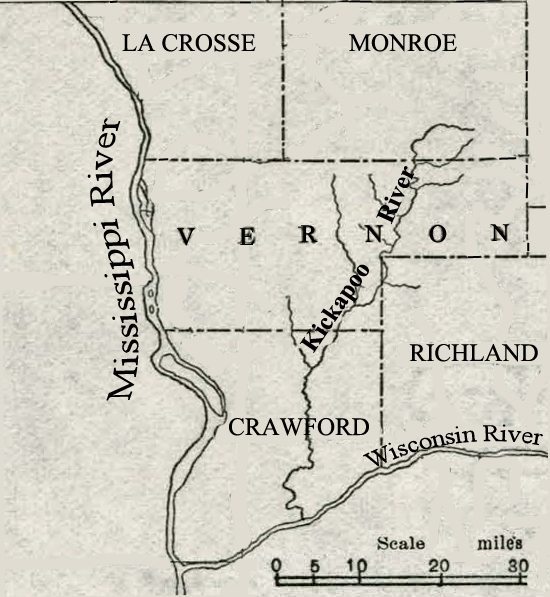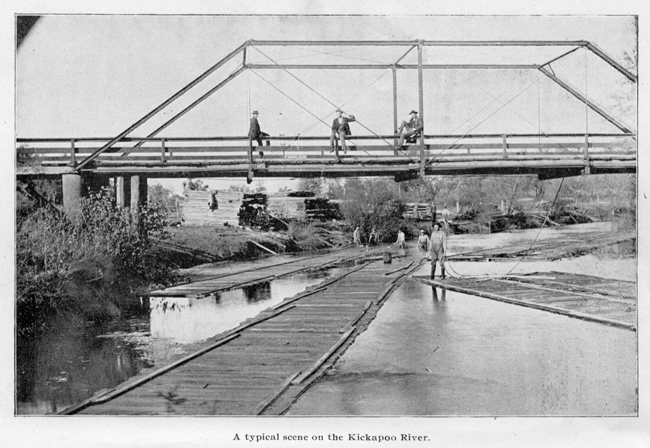Local History Topics
Logging on the Kickapoo
By Brad Steinmetz - Part II
Monday, September 14, 2020, marked the 150th anniversary of a tragic lumbering accident that took the lives of three young men and was immortalized by the poem, The Fatal Oak. The accident that occurred on September 14, 1870 on the Wisconsin River below Wauzeka, claimed the lives of Aaron Hatfield, George Lawton and James Roberts. The young men who were killed in the accident were from the La Farge area. They died at a time before there was a La Farge as we know it today. But it was a time during the lumbering boom of the northern Kickapoo Valley that drew them all to their tragic demise.

The accident that took the three lives became immortalized due to a poem written about it by Abigail J. Payne. Without going any further, let us look at that poem:
By Abigail J. Payne
Sad is the story I relate
Of three young men who met their fate
While folded in the arms of sleep
They sank beneath the waters deep
In blooming health they left the shore,
Ne’er thought they’d see their friends no more.
There were four brave boys upon a raft
With DeJean the captain of the craft.
Down they sailed on the Kickapoo
Laughing and joking as raftmen do.
Never thought their fate would come so soon
When death would rob them of their bloom.
When night came on they went to shore
Stopped where they oft had stopped before
‘Neath the same oak that had been their stay
They went to sleep at the close of day
The Captain viewed this tree once more
Spoke as he had sometimes spoke before
Saying, “Boys, I fear when it’s too late
This old tree will seal our fate”
The rapid current flowing there
Had washed its roots completely bare
But as they had often done before
They thought they’d tie to it once more
Early in the morning the Captain rose
And left the men in sleep reposed
And for some wood he stepped on shore
For to prepare their breakfast o’er
But scarcely had he stepped on shore
When looking at this tree once more
He saw it start and loud did cry
Saying, “Wake, my boys, or you must die”
There was none but Wilson that awoke
When with a crash down came the oak
The Captain stood alone on shore
He saw them sink to rise no more
But Wilson made his way at last
Something gave way that held him fast
The other three, who never woke
Were crushed beneath the fatal oak
For three long hours they searched in vain
Till at last two bodies they did obtain
They were Hatfield and Lawton, two boys brave
But Roberts still sleeps beneath the waves
Young Hatfield was the Captain’s pride
Long in his family did he reside
And seemed to him more like a son
Than like a child that was not his own
By land the Captain started home
Both night and day he journeyed on
Taking these boys to their friends
That they might see their last remains
When the sun was sinking in the west
These two boys were laid to rest
Their friends stood weeping round their tomb
No more they saw them in their bloom
It was but a glance and was o’er
Their friends could see their faces no more
Poor Juliette, the Captain’s wife
It seemed it would almost take her life
The Captain strove his grief to hide
But now he wrung his hands and cried
Saying, “This is a bitter cup
My boys, how can I give you up?”
Poor Robert’s friends, in deep despair
Longed for something of him to hear
They searched the river for miles around
When at Wyalusing he was found
And near the spot where he was found
There may be seen a little mound
‘Twas strangers hands that laid him there
No friends to shed a farewell tear
Friends and kindred brought him home
And laid him in the silent tomb
In death now sweetly sleeps the three
We leave them in the silent tomb
While many friends are left to mourn
With kindred friends whose hearts were broke
By the sudden fall of the fatal oak
- Raft was sunk September 14, 1870
Abigail Payne, wife of Truman, lived in Wauzeka at the time of the accident. She was a good friend of the DeJean family and came north up the river to comfort her friends after the tragedy. Her poem, The Fatal Oak, was written for the DeJean family. It may have been read at James Roberts’ funeral. Later it was published in the Viroqua newspaper, submitted by Anson DeJean. The poem became very popular and was always read at public gatherings in the area for decades after the accident. A variety of versions of the poem evolved over the years, and the poem also came to be a folk song, sung in the form of an elegy or dirge.
There have been many versions of the poem by Abigail Paine read and sung over the years. The words were put to music and the song was sung in the lumber camps along the Kickapoo. When the lumber was gone in the Kickapoo Valley, the lumbermen moved to northern Wisconsin and they took the song with them. From there, The Fatal Oak spread throughout the country and the tale of the Kickapoo lumber raft tragedy was known in lumber camps everywhere. It is a listed treasure of Wisconsin’s official folk music collection and there is at least one version of the song in the national registry of folk music.
Bert Wood lived to the ripe old age of 93, passing away in 1945. On his 90th birthday, he danced a lively jig on the sidewalk of La Farge’s Main Street. One of his favorite stories was telling about his fortunate fate in drawing the short sliver of wood and not being on the lumber rafts for that September trip in 1870.

Of the three lads who died on that fateful trip aboard the lumber rafts, Aaron Hatfield, who died at age 23, even had a story beyond his life. Aaron, the son of Peter and Lucinda Hatfield, who settled on a farmstead on what today is Bickel Road east of La Farge in 1867, was laid to rest at the Chapel Hill Cemetery in La Farge at the Anson DeJean family plot. Aaron Hatfield had worked for Anson DeJean for some time and lived with Anson and his wife, Julliaette, at the time of the accident. Apparently, he had become like a son to them. That is probably why Abigail Payne wrote the poem in the first place, as a way to help her good friends cope with the grieving.
According to the Hatfield family history, Aaron is buried there beside Anson and Juliaette DeJean. However, in the Chapel Hill Cemetery today, there is no marker for Aaron Hatfield at the DeJean family tombstone. One reason for that lack of inclusion at the gravesite was that Anson DeJean did not pass away until 28 years after the rafting accident and Juliaette 19 years after that. There was probably no gravestone at that family plot until Anson passed.
George Lawton, who was 30 years old when he drowned on the lumber raft, was laid to rest in the Lawton family cemetery near the top of Elk Point, located on the Lawton farm a couple miles south of La Farge. He came from a long line of lumbermen on the Kickapoo as the Lawton family name is tied to early lumbermills from Kickapoo Center to Oden. George Lawton was also a Civil War veteran, having served with Company H of the 5th Regiment of the Wisconsin Infantry in the war.
James Roberts was buried in the Star Cemetery, located at La Farge’s northern edge overlooking the Kickapoo River. His grave marker still lists that fateful date of the accident - September 14, 1870. The agony of his death at 21 years of age was intensified for the Roberts’ family as it was only seven years after James’ brother, Wilson, age 22, had been killed at the Battle of Gettysburg on July 1, 1863. James’ mother Hannah, never fully recovered from the loss of another son in such a tragic way, and died nine months after the rafting accident.
One hundred and fifty years later, the story of the tragic deaths of the three men on the Kickapoo lumber rafts remains with us. History has a way of living on.

 MENU
MENU